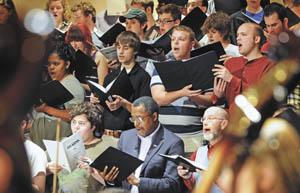All about Brahms
Published 12:00 am Thursday, April 7, 2011

- Miranda Pederson/Daily NewsThe Bowling Green Western Choral Society rehearses for “Brahms Fest” on Tuesday with The Symphony at WKU inside Van Meter Hall.
Bill Scott hasn’t met a piece by composer Johannes Brahms that he doesn’t like.
“I’m a big Brahms fan. I can’t think of a work that I’m not in love with,” said Scott, music director of The Symphony at WKU. “He could write so well for the symphony orchestra, so well for a cappella voice, so gifted for the choir. He fit the German language so well under his pen. You really get a beautiful result.”
The Symphony will have a whole event dedicated to the composer with “Brahms Fest.” Sponsored by Dr. John Fitts and Dr. Allan Pribble/Graves-Gilbert Clinic, the concert will be at 8 p.m. Friday at Western Kentucky University’s Van Meter Hall. Tickets are $22 in advance for adults and $5 for students and may be ordered by phone at 745-5222 or online at www.thesymphonyatwku.org.
There will be reserved parking for season ticket holders. Shuttle service will be available from the Adams Street parking lot and U.S. Bank at East Main Avenue and Chestnut Street. General parking is available off Kentucky Street and 14th Avenue lots. Disability parking and a ramp to the elevator is off the Potter Lot.
The Symphony will perform “Brahms Piano Concerto No. 2” with WKU professor of piano Sylvia Kersenbaum on the piano and “Schicksalslied (Song of Destiny)” and “NŠnie” with the Bowling Green-Western Choral Society.
“This will be the second all-Brahms concert for me,” Scott said. “I did one in South Carolina before coming here.”
The music The Symphony will perform has stories behind it. For example, “Schicksalslied (Song of Destiny),” was a requiem motivated by the death of his mother, taking mortality as its theme, Scott said. “NŠnie” is a tribute to late German painter Anselm Feuerbach.
“He mourns the passing of beauty, which the gods and goddesses are helpless to prevent,” he said.
“Brahms Piano Concerto No. 2” was dedicated to Eduard Marxsen, Brahms’ first piano teacher with whom he began studying at age 7, Scott said.
“It incorporates the piano and the orchestra together so well,” he said. “It’s like a symphony that demands the virtuosity of a great pianist.”
Kersenbaum said she has been looking forward to the concert since Scott asked her to do “Brahms Piano Concerto No. 2.”
“I knew the piece and loved it. I’ve had that score with me since I was 14,” she said. “My father had a young employee who gave me a birthday present of Brahms’ second. I never played it, but I looked at it and studied it. When you learn something at that age, you never forget.”
Brahms brings about various feelings, Kersenbaum said.
“All his feelings are so human. It’s not that overwhelming. It has everything in just melodies and changes of mood,” she said. “You go from rage to calm and resignation, from passion to joy.”
Kersenbaum said more younger people are becoming interested in Brahms.
“I am overwhelmed by the love of Brahms from young people. It used to be that a composer was revered, almost feared. Now I see excitement. I see joy,” she said. “Part of it is that they are getting a little more free as far as expression. Interpreters are more free, within limits, to express themselves. That’s what keeps it alive, lively and appealing to younger audiences.”





